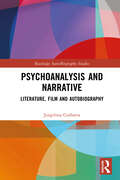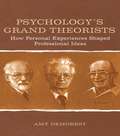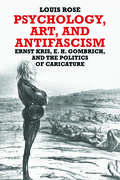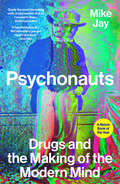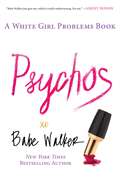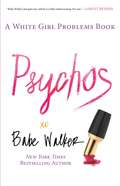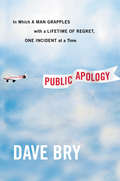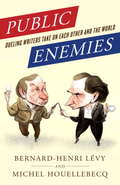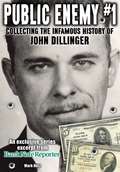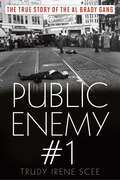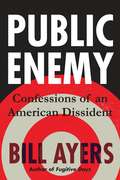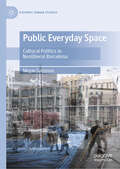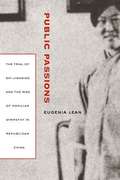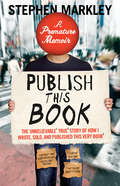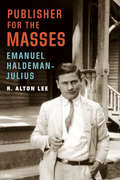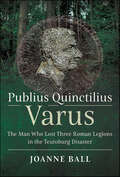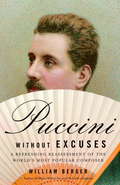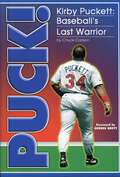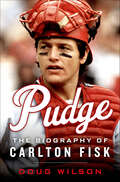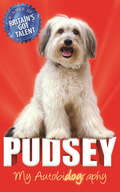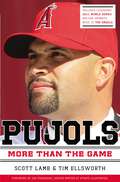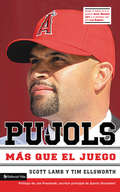- Table View
- List View
Psychoanalysis and Narrative: Literature, Film and Autobiography (ISSN)
by Jorgelina CorbattaPsychoanalysis and Narrative analyzes narrative in literary fiction, film, and autobiography through different psychoanalytic lenses including gender and socio-cultural perspectives. This book aims to demonstrate how fictionists and film makers have intuitively developed – through their own creativity – many of the psychoanalytic discoveries about the human mind. Subverting the usual direction of “applied psychoanalysis,” the book goes from creativity to psychoanalysis, and focuses on four internationally known Argentine writers: Jorge Luis Borges, Julio Cortázar, Manuel Puig, and Luisa Valenzuela; two Argentine women filmmakers, Lucrecia Martel and Lucía Puenzo; and French essayist and writer Serge Doubrovsky. This volume will be of interest to students and academics interested in autobiography and autofiction.
Psychology's Grand Theorists: How Personal Experiences Shaped Professional Ideas
by Amy P. DemorestPsychology's Grand Theorists argues that the three schools in psychology that have been dominant historically--the psychodynamic, behavioral, and phenomenological--have resulted in large part from the personal experiences of their originators. Sigmund Freud, B.F. Skinner, and Carl Rogers each believed that he had discovered the truth about human nature, yet their truths are entirely different. This book explores how the lives of these men influenced the divergent theories they developed, through a close examination of letters, diaries, biographies, autobiographies, and professional writings. Uncovering the subjective sources of these theories, the book gives the reader a greater sense of intimacy with each man's ideas, and promotes critical inquiry into their scientific status. The book is written in an engaging style that will appeal to a wide range of readers. Intended as a supplement in courses on personality, clinical psychology, and/or the history of psychology, it will also be of interest to clinicians or counselors who use one or more of these theoretical models in their therapeutic work.
Psychology, Art, and Antifascism: Ernst Kris, E. H. Gombrich, and the Politics of Caricature
by Louis RoseA vivid portrait of two remarkable twentieth-century thinkers and their landmark collaboration on the use and abuse of caricature and propaganda in the modern world In 1934, Viennese art historian and psychoanalyst Ernst Kris invited his mentee E. H. Gombrich to collaborate on a project that had implications for psychology and neuroscience, and foreshadowed their contributions to the Allied war effort. Their subject: caricature and its use and abuse in propaganda. Their collaboration was a seminal early effort to integrate science, the humanities, and political awareness. In this fascinating biographical and intellectual study, Louis Rose explores the content of Kris and Gombrich's project and its legacy.
Psychonauts: Drugs and the Making of the Modern Mind
by Mike JayA provocative and original history of the scientists and writers, artists and philosophers who took drugs to explore the hidden regions of the mind A New Yorker Best of the Week Pick “Jay is a leading expert on the history of Western drug use, and Psychonauts is the latest in a series of excellent studies in which he has investigated the roots of a kind of psychoactive exploration that we tend to associate with the nineteen-fifties and sixties.”—Clare Bucknell, New Yorker “Captivating. . . . A welcome reconsideration of the role drugs play in life, medicine, and science.”—Publishers Weekly Until the twentieth century, scientists investigating the effects of drugs on the mind did so by experimenting on themselves. Vivid descriptions of drug experiences sparked insights across the mind sciences, pharmacology, medicine, and philosophy. Accounts in journals and literary fiction inspired a fascinated public to make their own experiments—in scientific demonstrations, on exotic travels, at literary salons, and in occult rituals. But after 1900 drugs were increasingly viewed as a social problem, and the long tradition of self-experimentation began to disappear. From Sigmund Freud’s experiments with cocaine to William James’s epiphany on nitrous oxide, Mike Jay brilliantly recovers a lost intellectual tradition of drug-taking that fed the birth of psychology, the discovery of the unconscious, and the emergence of modernism. Today, as we embrace novel cognitive enhancers and psychedelics, the experiments of the original psychonauts reveal the deep influence of mind-altering drugs on Western science, philosophy, and culture.
Psychos: A White Girl Problems Book
by Babe WalkerIf you’re one of the hundreds of thousands who devoured Babe Walker’s New York Times bestselling novel White Girl Problems or one of the million people who read her blog or follow her on Twitter daily, then you’ve obviously been waiting with bated breath for her hilarious follow-up novel, Psychos.<P> Fresh from a four-month stint in rehab for her “alleged” shopping addiction, Babe Walker returns home to Bel Air ten pounds lighter (thanks to a stomach virus), having made amends (she told a counselor with bad skin she was smart) and confronted her past (after meeting her birth mother for the first time—a fashion model turned farmer lesbian). Although delighted to be home and determined to maintain her hard-won inner peace, Babe now faces a host of outside forces seemingly intent on derailing her path to positive change. Not only is she being trailed by an anonymous stalker, but she’s also reunited with the love of her life, a relationship that she cannot seem to stop self-sabotaging.<P> Babe’s newfound spirituality, coupled with her faith in the universe and its messages, leads her all over the world: shoulder dancing in Paris, tripping out in Amsterdam, and hooking up in the Mediterranean, only to land her back in New York City, forced to choose between a man who is perfect in every way (except for one small detail) and a man who could be The One if only he didn’t drive Babe to utter insanity.<P> Unapologetic and uproarious, Psychos is the send-up of the season—already as timeless as vintage Dior.
Psychos: A White Girl Problems Book
by Babe WalkerIf you're one of the hundreds of thousands who devoured Babe Walker's New York Times bestselling novel White Girl Problems or one of the million people who read her blog or follow her on Twitter daily, then you've obviously been waiting with bated breath for her hilarious follow-up novel, Psychos. Fresh from a four-month stint in rehab for her "alleged" shopping addiction, Babe Walker returns home to Bel Air ten pounds lighter (thanks to a stomach virus), having made amends (she told a counselor with bad skin she was smart) and confronted her past (after meeting her birth mother for the first time--a fashion model turned farmer lesbian). Although delighted to be home and determined to maintain her hard-won inner peace, Babe now faces a host of outside forces seemingly intent on derailing her path to positive change. Not only is she being trailed by an anonymous stalker, but she's also reunited with the love of her life, a relationship that she cannot seem to stop self-sabotaging. Babe's newfound spirituality, coupled with her faith in the universe and its messages, leads her all over the world: shoulder dancing in Paris, tripping out in Amsterdam, and hooking up in the Mediterranean, only to land her back in New York City, forced to choose between a man who is perfect in every way (except for one small detail) and a man who could be The One if only he didn't drive Babe to utter insanity. Unapologetic and uproarious, Psychos is the send-up of the season--already as timeless as vintage Dior.
Public Apology: In Which a Man Grapples With a Lifetime of Regret, One Incident at a Time
by Dave BryDave Bry is sorry. Very sorry. He's sorry to Wendy Metzger for singing the last verse of "Stairway to Heaven" into her ear while slow dancing in junior high school. He's sorry to Judy and Michael Gailhouse for letting their children watch The Amityville Horror when he babysat them. And he's sorry--especially, truly--that he didn't hear his cancer-ridden father call out for help one fateful afternoon. Things are different now. Dave's become a dad, too, and he's discovered a new compassion for the complicated man who raised him. And maybe if his 17-year-old self could meet his current self, he'd think twice before throwing beer cans on Jon Bon Jovi's lawn. Dave's apologies are at turns hysterically funny and profoundly moving, ultimately adding up to a deeply human, poignant and likable portrait of a man trying to come to grips with his past.
Public Enemies: Dueling Writers Take On Each Other and the World
by Bernard-Henri Lévy Michel HouellebecqTwo brilliant, controversial authors confront each other and their enemies in an unforgettable exchange of letters. In one corner, Bernard-Henri Lévy, creator of the classic Barbarism with a Human Face, dismissed by the media as a wealthy, self-promoting, arrogant do-gooder. In the other, Michel Houellebecq, bestselling author of The Elementary Particles, widely derided as a sex-obsessed racist and misogynist. What began as a secret correspondence between bitter enemies evolved into a remarkable joint personal meditation by France's premier literary and political live wires. An instant international bestseller, Public Enemies has now been translated into English for all lovers of superb insights, scandalous opinions, and iconoclastic ideas. In wicked, wide-ranging, and freewheeling letters, the two self-described "whipping boys" debate whether they crave disgrace or secretly have an insane desire to please. Lévy extols heroism in the face of tyranny; Houellebecq sees himself as one who would fight little and badly. Lévy says "life does not live" unless he can write; Houellebecq bemoans work as leaving him in such "a state of nervous exhaustion that it takes several bottles of alcohol to get out." There are also touching and intimate exchanges on the existence of God and about their own families. Dazzling, delightful, and provocative, Public Enemies is a death match between literary lions, remarkable men who find common ground, confident that, in the end (as Lévy puts it), "it is we who will come out on top."
Public Enemy #1 - the Infamous History of John Dillinger
by Hotz MarkIn this exclusive excerpt from Bank Note Reporter, learn and collect the biography of the 1930's Public Enemy #1, bank robber and gangster John Dillinger. From his earliest bank robberies and run-ins with the law, to life on the lam with the likes of Lester "Baby Face" Nelson, John Hamilton and Evelyn Billie Frechette to Dillinger's death at the hands of the FBI, author Mark Hotz details the gangster's exploits with a bank note collector's twist. Replete with both modern and contemporaneous images and note information, step back into the infamous history of John Dillinger like never before.
Public Enemy Number One: The True Story of the Brady Gang
by Trudy Irene SceeAl Brady was an armed robber and murderer in the 1930s and became the FBI's Public Enemy #1. The crime spree of Brady and his gang brought them from the south and midwest to Maine. A hardware store owner in Bangor became suspicious when Brady requested a large supply of ammunition and paid with an equally large amount of cash, and notified police. The FBI was waiting in ambush for them when they arrived to pick up the ammo. The rest is history, as on October 12, 1937, Brady and an accomplice were killed in a hail of bullets in broad daylight in downtown Bangor. This spectacular public gun-battle has become an integral part of Maine lore. Now, historian Trudy Irene Scee tells the story, including Brady's growing up in Indiana, his criminal exploits, and what brought he and his cohorts to Maine.
Public Enemy: Confessions of an American Dissident
by Bill AyersIn this sequel to Fugitive Days, Ayers charts his life after the Weather Underground, when he becomes the GOP's flaunted "domestic terrorist," a "public enemy." Labeled a "domestic terrorist" by the McCain campaign in 2008 and used by the radical right in an attempt to castigate Obama for "pallin' around with terrorists," Bill Ayers is in fact a dedicated teacher, father, and social justice advocate with a sharp memory and even sharper wit. Public Enemy tells his story from the moment he and his wife, Bernardine Dohrn, emerged from years on the run and rebuilt their lives as public figures, often celebrated for their community work and much hated by the radical right. In the face of defamation by conservative media, including a multimillion-dollar campaign aimed solely at demonizing Ayers, and in spite of frequent death threats, Bill and Bernardine stay true to their core beliefs in the power of protest, demonstration, and deep commitment. Ayers reveals how he has navigated the challenges and triumphs of this public life with steadfastness and a dash of good humor--from the red carpet at the Oscars, to prison vigils and airports (where he is often detained and where he finally "confesses" that he did write Dreams from My Father), and ultimately on the ground at Grant Park in 2008 and again in 2012.
Public Everyday Space: Cultural Politics in Neoliberal Barcelona (Hispanic Urban Studies)
by Megan SaltzmanThis book explores how everyday practices in public space (sitting, playing, walking, etc.) challenge the increase of top-down control in the global city. Public Everyday Space focuses on post-Olympic Barcelona—a time of unprecedented levels of gentrification, branding, mass tourism, and immigration. Drawing from examples observed in public spaces (streets, plazas, sidewalks, and empty lots), as well as in cultural representation (film, photography, literature), this book exposes the quiet agency of those excluded from urban decision-making but who nonetheless find ways to carve out spatial autonomy for themselves. Absent from the map or postcard, the quicksilver spatial phenomena documented in this book can make us rethink our definitions of culture, politics, inclusion, legality, architecture, urban planning, and public space.
Public Passions: The Trial of Shi Jianqiao and the Rise of Popular Sympathy in Republican China
by Eugenia LeanIn 1935, a Chinese woman called Shi Jianqiao murdered the notorious warlord Sun Chuanfang as he prayed in a Buddhist temple. This work of history examines this crime and the highly sensationalized trial of the killer. In a fascinating investigation of the media, political, and judicial records surrounding this cause celebre, Eugenia Lean shows how Shi Jianqiao planned not only to avenge the death of her father, but also to attract media attention and galvanize public support.
Publish This Book: The Unbelievable True Story of How I Wrote, Sold and Published This Very Book
by Stephen MarkleyDear Reader-This is called the "back cover copy," and you are no doubt familiar with its purpose. It describes what the book is about, so you can decide if you want to read it. Here's the problem, though: I can't even describe this book, and I wrote the damn thing. (1)Basically, it's like this: fed up with the Byzantine quest of trying to publish a novel, I decide instead to cut to the chase and write a memoir about trying to publish a book--this book, to be precise. Of course, now you're saying to yourself, "That is stupid," which is fair. But then you'll read it, and you'll say, "Damn, that was actually pretty good. "Because obviously it's about much more than just publishing a book. It's about life and love and friendship; politics, pop culture, and basketball; sex, drugs, and mild, inoffensive, slow-tempo Christian rock. (2)It's about the pitfalls of narrating your life as it unfolds, freaking out when an agent actually (spoiler alert!) takes an interest in this bizarre experiment, and the surreal shock you undergo when a publisher actually buys it(3) and you suddenly realize that every secret drunk, drug, and sex story you've related will now be required reading for your parents, aunts, ex-girlfriends, and thousands of strangers who-you were kind of hoping-would never find out that you once accidentally shut your penis in a dresser drawer. (4)And finally, but most importantly, it's about those tumultuous early years of adulthood-the years when hope and fear and rage broil together and the promise of youth still holds the capacity to inspire awe. This is a story of those struggles-to find your true voice in your work and in your life. And the best part?You pretty much know it has a happy ending. (5)2 It is not really about that last one. 3 And then later makes you write your own back cover copy even though you clearly do not know what you're doing. 4 Although I'll dodge a bullet there because I totally left that story out of the book. 5 Except for what happens to the puppy at the fertilizer plant. I admit, that part is kind of a downer.
Publisher for the Masses, Emanuel Haldeman-Julius
by R. Alton LeeHis admirers called him the “Barnum of Books” and the “Voltaire of Kansas” because of his ability to bring culture and education to the people. R. Alton Lee brings to life Emanuel Haldeman-Julius (1889–1951), a writer-publisher-entrepreneur who was one of America’s most significant publishers and editorialists of the twentieth century. His company published a record 500,000,000 copies of 2,580 titles and was second only to the U.S. Government Printing Office in the quantity of publications it produced. Lee details Haldeman-Julius’s family origins in Russia and his formative years in Philadelphia, where he learned the book trade. As a writer and editor for the Social Democrat, Sunday Call, and Western Comrade, Haldeman-Julius was already well known by the time he launched his own publishing company. Haldeman-Julius knew, was nurtured by, and published writers such as Jack London, Upton Sinclair, Jane Addams, Emma Goldman, H. L. Mencken, Carl Sandburg, Eugene V. Debs, Clarence Darrow, Job Harriman, Will Durant, and Bertrand Russell, among others. Based in Girard, Kansas, his company, Haldeman-Julius Publications, covered socialist politics, the philosophy of free thought, and both new and classic books marketed to ordinary Americans, including the Little Blue Book series of classics in Western thought and literature. This biography of the enigmatic and energetic Haldeman-Julius opens a window into the fascinating world of early twentieth-century radical politics and publishing.
Publius Quinctilius Varus: The Man Who Lost Three Roman Legions in the Teutoburg Disaster
by Joanne BallThis unique full-length English biography of Varus reassesses how he has been held responsible for one of the most infamous and humiliating defeats in Roman history. Publius Quinctilius Varus is famous as the incompetent commander duped into an ambush that wiped out three legions in one of the most humiliating defeats in Roman history. Yet this is the first full length biography of the man. Dr Joanne Ball revisits the ancient sources alongside the most recent archaeological evidence from the Teutoburg battlefield in Germany, where she has been personally involved in excavations. The result is a fresh, detailed new analysis of this significant battle and a reappraisal of the Roman commander. Examination of his earlier career reveals that Varus, who had married into the Imperial family, was an experienced and competent, if harsh and ruthless, governor and general. He had served in Africa and put down rebellions in Syria and Judaea before being posted to Germany. Dr Ball sets his German command in the context of wider events, explaining the weakness of the Roman position there and the necessary reliance on auxiliary forces. Although Varus was clearly fooled by Arminius, the former Roman auxiliary who masterminded the Teutoburg battle in AD 9, she questions the extent of Varus’ culpability and asks whether he was scapegoated by Roman historians to deflect blame away from the Emperor.
Puccini Without Excuses: A Refreshing Reassessment of the World's Most Popular Composer
by William BergerPuccini is the most beloved composer of opera in the world: one quarter of all opera performances in the U.S. are of his operas, his music pervades movie soundtracks, and his plots have infiltrated our popular culture. But, although Puccini’s art still captivates audiences and the popularity of such works as Tosca, La Boh?me, and Madama Butterfly has never waned, he has long been a victim of critical snobbery and cultural marginalization.In this witty and informative guide for beginners and fans alike, William Berger sets the record straight, reclaiming Puccini as a serious artist. Combining his trademark irreverent humor with passionate enthusiasm, Berger strikes just the right balance of introductory information and thought-provoking analysis. He includes a biography, discussions of each opera, a glossary, fun facts and anecdotes, and above all keen insight into Puccini’s enduring power. For anyone who loves Puccini and for anyone who just wonders what all the fuss is about, Puccini Without Excuses is funny, challenging, and always a pleasure to read. INCLUDES:_ Why Puccini’s art and its message of hope is crucial to our world today_ How Anglo audiences often miss the mythic significance of his operas_ The use of his music as shorthand in films, from A Room with a View to Fatal Attraction_ A scene-by scene analysis of each opera_ A guide to the wealth of available recordings, books, and videos
Puck Kirby Puckett
by Chuck CarlsonThis is the story of Kirby Puckett and his remarkable journey from the projects of the south.
Pudge: The Biography of Carlton Fisk
by Doug WilsonFrom a Casey Award finalist, the first biography of Hall of Fame catcher Carlton Fisk: “A home run all the way.” —Leigh Montville, New York Times–bestselling author of The Big Bam: The Life and Times of Babe RuthCarlton Fisk retired having played in more games and hit more home runs than any other catcher before him. A baseball superstar in the 1970s and ‘80s, Fisk was known not just for his dedication to the sport and tremendous plays but for the respect with which he treated the game.A homegrown icon, Fisk rapidly became the face of one of the most storied teams in baseball, the Boston Red Sox of the 1970s. As a rookie making only $12,000 a year, he became the first player to unanimously win the American League Rookie of the Year award in 1972, upping both his pay grade and national recognition. Fisk’s game-winning home run in Game Six of the hotly contested 1975 World Series forever immortalized him in one of the sport’s most exciting televised moments. Fisk played through an epic period of player-owner relations, including the dawn of free agency, strikes, and collusions. After leaving Boston under controversy in 1981, he joined the Chicago White Sox, where he played for twelve more major league seasons, solidifying his position as one of the best catchers of all time.Doug Wilson, finalist for both the Casey Award and Seymour Medal for his previous baseball biographies, uses his own extensive research and interviews with Fisk’s childhood friends and major league teammates to examine the life and career of a leader who followed a strict code and played with fierce determination.Includes photos“Wilson received much-deserved praise for his biographies of Mark Fidrych and Brooks Robinson. This fine book is every bit their equal.” —Booklist (starred review)
Pudsey: A Pup Star's Story
by PudseyLast year, a dog danced his way into the history books as the first canine winner of Britain's Got Talent. On their way to the title, Pudsey and his owner Ashleigh Butler won over Walliams, delighted Dixon, stole the heart of Holden, and utterly captivated Cowell. They charmed the nation, too - with millions of families tuning in to see them take the crown.As a young pup, Pudsey always knew he was somehow different to other puppies. While his brothers and sisters contented themselves with chasing their tails, he sat apart, hoping for something more. Pudsey: A Pup Star's Story tells the story of his incredible, inspirational journey, straight from the dog's mouth.
Pudsey: A Pup Star's Story
by PudseyLast year, a dog danced his way into the history books as the first canine winner of Britain's Got Talent. On their way to the title, Pudsey and his owner Ashleigh Butler won over Walliams, delighted Dixon, stole the heart of Holden, and utterly captivated Cowell. They charmed the nation, too - with millions of families tuning in to see them take the crown.As a young pup, Pudsey always knew he was somehow different to other puppies. While his brothers and sisters contented themselves with chasing their tails, he sat apart, hoping for something more. Pudsey: A Pup Star's Story tells the story of his incredible, inspirational journey, straight from the dog's mouth.
Pudsey: My Autobidography
by PudseyEarlier this year, a dog danced his way into the history books as the first canine winner of Britain's Got Talent. En route to the title, Pudsey and his owner Ashleigh Butler won over Walliams, delighted Dixon, stole the heart of Holden, and utterly captivated Cowell. They charmed the nation, too - with millions of viewers tuning in to see them take the crown. But what do we really know of Pudsey's journey to stardom? How did he get from being a depressed dog to the mutt of the moment? In this, the most unusual celebrity book of the year, he's finally ready to tell his tale. As a young pup, Pudsey always knew he was somehow different to his dog-standard peers. While his brothers and sisters contented themselves with chasing their tails, he sat apart, yearning for something more. With the help of the menagerie of pets that fill the Butler household and despite some dastardly opposition threatening to stop him at every turn, Pudsey managed to achieve his dream. This Autobidography tells the story of his incredibly journey, straight from the dog's mouth.
Pudsey: My Autobidography
by PudseyEarlier this year, a dog danced his way into the history books as the first canine winner of Britain's Got Talent. En route to the title, Pudsey and his owner Ashleigh Butler won over Walliams, delighted Dixon, stole the heart of Holden, and utterly captivated Cowell. They charmed the nation, too - with millions of viewers tuning in to see them take the crown.But what do we really know of Pudsey's journey to stardom? How did he get from being a depressed dog to the mutt of the moment? In this, the most unusual celebrity book of the year, he's finally ready to tell his tale.As a young pup, Pudsey always knew he was somehow different to his dog-standard peers. While his brothers and sisters contented themselves with chasing their tails, he sat apart, yearning for something more. With the help of the menagerie of pets that fill the Butler household and despite some dastardly opposition threatening to stop him at every turn, Pudsey managed to achieve his dream. This Autobidography tells the story of his incredibly journey, straight from the dog's mouth.
Pujols Revised and Updated: More Than the Game
by Tim Ellsworth Scott LambAfter a decade starring for the St. Louis Cardinals, Albert Pujols is already compared with names in the highest reaches of baseball’s pantheon: Ruth, Gehrig, Aaron, Mays. Slugging his way toward the Hall of Fame, Pujols has raised the game’s standard for greatness beyond any statistical measure. But the standard by which Pujols measures himself has less to do with baseball performance than with honoring God and exemplifying his faith for the millions who follow him. From his birthplace in the Dominican Republic to his high-school days in Kansas City, from a single season in the minor leagues to the World Series and nine All-Star Games, Pujols has developed his immense talents on the baseball diamond, all the while focusing his direction—and the direction of his family—with the belief that a higher power is behind every achievement. Authors Scott Lamb and Tim Ellsworth spare no tale of this growing baseball legend, all the while accentuating “the unseen hand of divine providence” that has shaped the man Albert Pujols has become. It’s a story that will inspire, and a reminder of the human quality behind superhuman achievement. A story—still in the making—of allowing God’s strength to guide one man’s path to be the best his game has ever seen. His numbers are staggering. In 2010 Albert Pujols became the first player in baseball history to bat .300 with 30 home runs and 100 runs batted in for ten consecutive seasons. Babe Ruth didn’t do it. Ted Williams didn’t do it. Hank Aaron didn’t do it. The fact that this was accomplished in Pujols’ first ten seasons only makes the achievement more, well, Ruthian. Albert Pujols’ story goes beyond numbers, though. Beyond the bright lights and packed stadiums of Major League Baseball. Even beyond the adulation of millions who have come to see the St. Louis Cardinal star as the rare “once-in-a-lifetime-player” who transcends team loyalties. Through the 2010 season, Pujols hit 408 home runs. And every time he touched home plate after sending another baseball to a random bookshelf or trophy case, Pujols pointed heavenward. Toward the strength behind his otherworldly talents, toward the inspiration that lifts him on a daily basis, regardless of his team’s place in the standings. For Jesus Christ is Albert Pujols’ first love. Faith, family, then maybe baseball. Endorsements: “He matches in his personal life the excellence that he demonstrates on the diamond. You will love this book and will love Pujols if you don’t already.” —Mike Huckabee , 44th Governor of Arkansas, Former Republican presidential candidate, Host of Fox News ’ Huckabee Show, Best-selling author But Pujols’ argument for greatest player ever isn’t nearly as interesting or significant as the fact that there even is an argument. That’s because perhaps the most amazing thing about Albert Pujols is that less than two years before he began one of the greatest rookie seasons in baseball history, he was a non-prospect." -Joe Posnanski, Senior Writer at Sports Illustrated (included in the Foreword) "Pujols is full of nuggets. Given that the action in the famous poem "Casey at the Bat" starts with “Cooney died at first, and Barrows did the same,” I enjoyed reading that Albert Pujols asks opposing runners at first base, “If you died today, where do you think you’re going to go?” Lamb and Ellsworth lucidly describe both the season-by-season baseball exploits of Pujols and the impact he’s having on some lives for eternity." -Marvin Olasky, Editor-in-chief, World
Pujols: Más allá del béisbol
by Tim Ellsworth Scott LambDespués de una década de estrellato en los Cardenales del Saint Louis, Albert Pujols es comparado ya con jugadores cuyos nombres figuran en lo más alto del panteón del béisbol: Ruth, Gehrig, Aaron, Mays. Abriéndose paso con su bate hasta el Salón de la Fama, Pujols ha levantado el estándar de grandeza del juego por encima de todas las medidas estadísticas. Pero el estándar por el cual Pujols se mide a sí mismo tiene menos que ver con el béisbol que con su deseo de honrar a Dios y dar ejemplo de su fe ante sus millones de seguidores. Los autores Scott Lamb y Tim Ellsworth no nos dejan sin contar ninguna historia de esta leyenda del béisbol aún en crecimiento, al mismo tiempo que destacan “la mano invisible de la divina providencia”, que le ha dado forma al hombre en que Albert Pujols se ha convertido. Es un relato inspirador, y un recuerdo de la calidad de un ser humano detrás de unos logros sobrehumanos.
